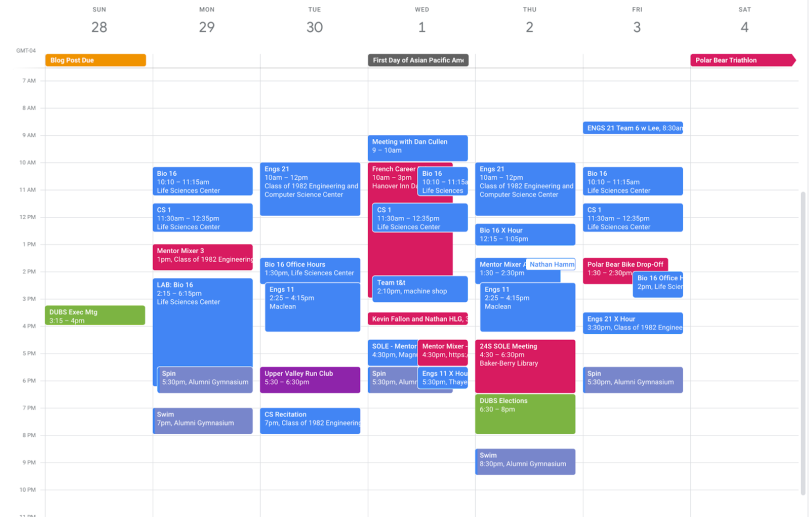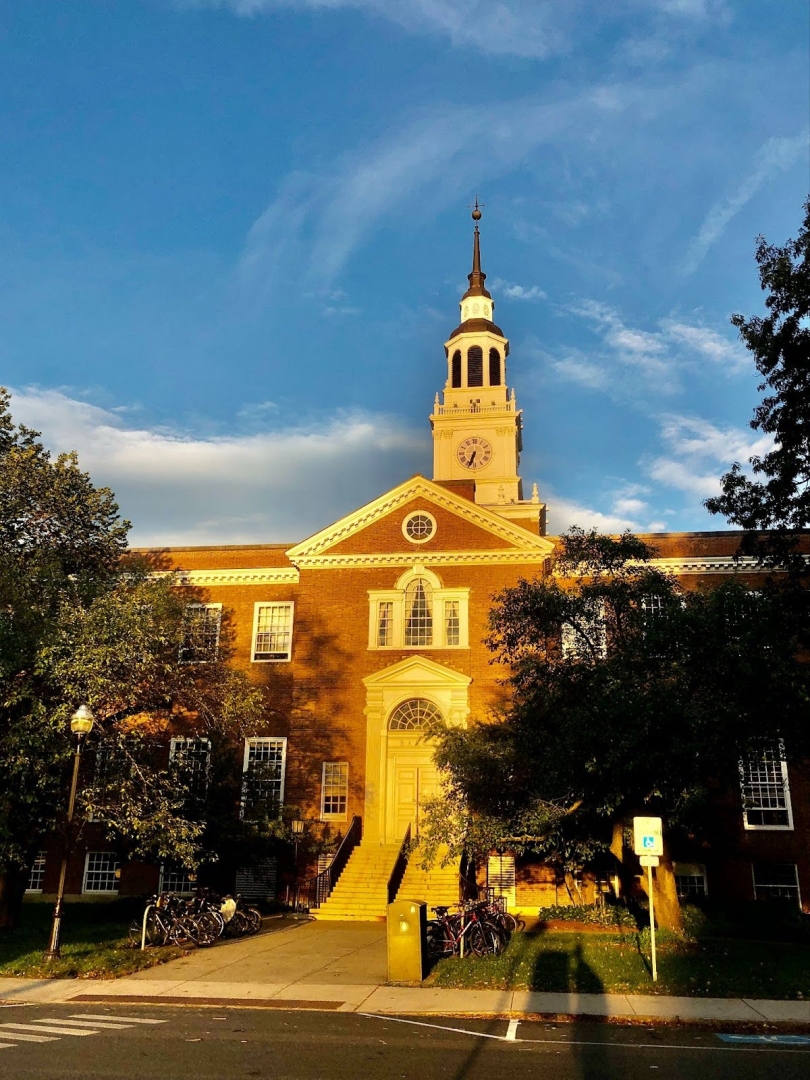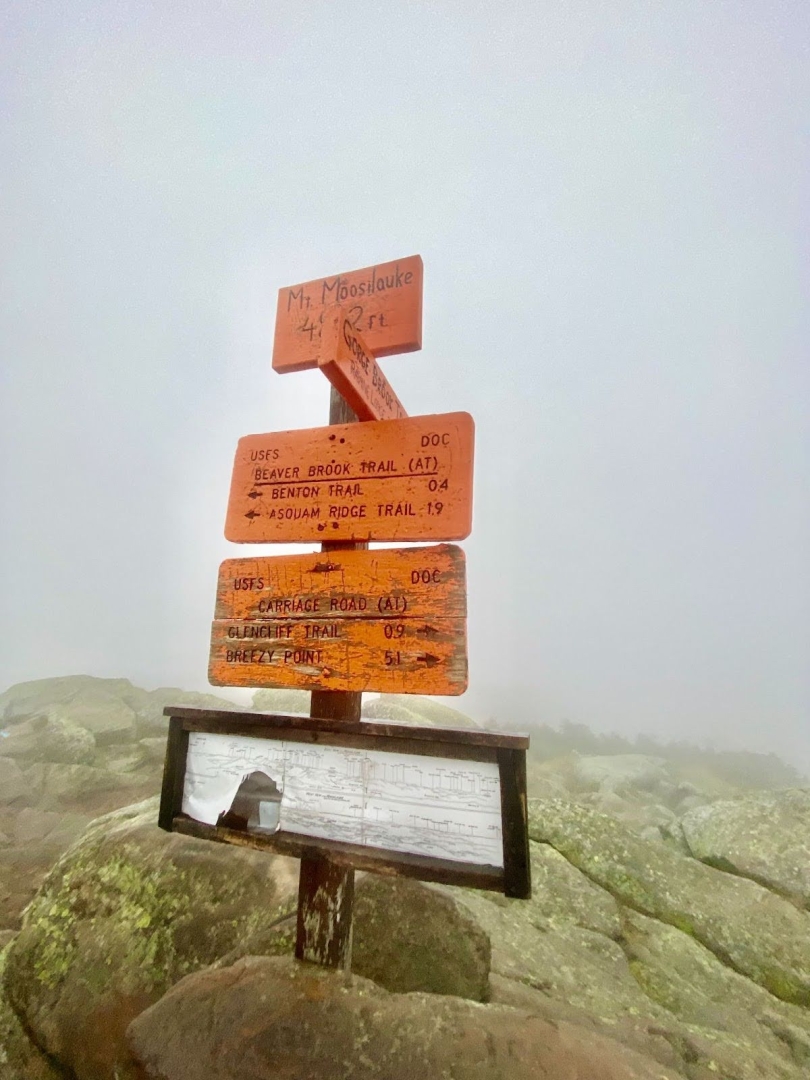
A Guide to Dartmouth Schedules
After a week or two into my Freshman Fall, I realized that time-management is pretty much the single most important factor in making sure you feel balanced and on-track. At a place like Dartmouth—where each term is 10 weeks long and the courses move quickly—the ability to manage your time saves you from going off the rails and reduces your overall stress levels. I can't say I was able to perfect my time-management from my first week, first term, or even first year for that matter—but I've realized what it takes to stay organized from my own experience (and, of course, the awesome students I befriend). The following elements are what I believe it takes to feel well and productive at Dartmouth.
1. The Foundation: Classes, Meals, and Sleep
For me, the foundation of a weekly schedule includes time spent in activities that are non-negotiable. That includes class time, meals, and sleep. Classes can come first (in organization and not in priority) because they'll dictate where else you spend your time. I plug all my lecture time and X-hours (a time-block Professors will sometimes choose to use for extra class time) into Google Calendar to get a feel for what a given week of the term will look like. Most classes at Dartmouth either run Monday, Wednesday, Friday for an hour, or Tuesday and Thursday for longer. Then, based on the location of my dorm and classes, I can plan where I can prep for classes and get meals between classes. If you unfortunately selected classes that put you in lectures from hours like 11 - 2 (two or three back to back classes like I did one term), then the timing of meals would be altered (something to keep in mind during course selection). Sleep is another of these non-negotiable time commitments. There are many sleep philosophies in college, but ultimately what matters is what time you begin the day and end the day. Factoring these times into the foundation of your weekly schedule will provide a blueprint for what time exists to complete classwork, exercise, spend time with friends, participate in extracurriculars, or go on trips. Dartmouth is a place with overwhelming options to spend your time, so thriving here requires identification of your genuine values and self-initiative.

2. Deep work, Exercise, and Extracurriculars
There's this magical process that occurs every so often during the week. I sit down with a coffee somewhere in the library, open my laptop, and whatever needs to be written or solved actually gets written or solved. It's a fleeting, elusive process that I wish I had more control over. For some, that process is called entering a "flow" state in which the external environment fades away and you become engrossed in the task at hand. For Dartmouth alum, renowned author, and computer scientist Cal Newport, that process is called "deep work." It's the type of cognitively demanding work that we can only really sustain for three to four hours at maximum.
This is where time-blocking comes in. Once the timing and location of your classes have been established and the general structure of your day is known, you can strategically block-out the gaps between each non-negotiable period of time. I like to fit in my "deep work" on days when no classes are happening (so for most, Tuesday and Thursday) and I'm not worried about finishing a particular task in time. In the late afternoon, I fit in an exercise bout, usually a workout with the Triathlon team. It's in the evening that I might also schedule time to attend a club meeting or attend a seminar I'm interested in. Time-blocking is ultimately a strategy that allows you to determine which commitments can be placed where and the total volume of extracurriculars you can take on in any given week. Of course, more is not necessarily better; I just think intentionality and awareness of when time is available—or not available–is crucial to avoiding imbalances in daily life.

3. Downtime, Trips, and... Trips
Then there are blocks of time on Fridays, the Weekend, and occasionally lighter days during the week. These are where activities that aren't "necessary" can come into play (hint: they're still extremely important). Some examples might include a day trip to a nearby city like Boston or Montreal, a DOC trip in the second college grant, or even simply playing frisbee on the Green. What I've found is that the memories you make if you take these opportunities to craft mini adventures, you'll come away from the term more fulfilled. You'll have stronger memories largely defined by moments like these. At the end of the Winter Term, for example, it's not that random Thursday afternoon I studied in the library that I'll remember, it's the snowball fight on the Green at midnight, the time I went nordic skiing, or the brunch with friends at Lou's. That's what I'll remember, and that's a reason why I'm here.

















